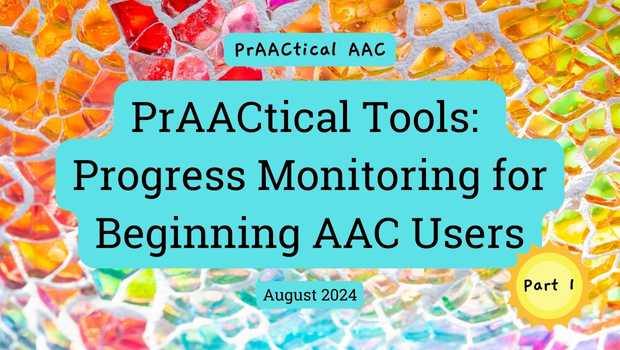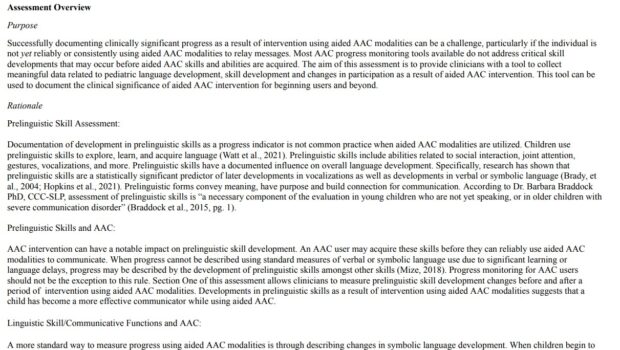PrAACtical Tools: Progress Monitoring for Beginning AAC Users

Measuring progress can be challenging when working with individuals who are in the beginning stages of AAC use. Today, we’re excited to introduce a guest post by AAC SLP Sara Ware, who is generously sharing a tool that can help clinicians and educators track their clients’ trajectory of AAC learning. Sara created this tool with her colleague Carolyn Sparrow, and it is now in its second edition. In the first of two posts, Sara explains the origins of this helpful form and shares a link for you to download it.
Reference
Stay tuned for a second post from Sara later this month in which she discusses the implementation of this progress monitoring tool.
Enjoy!
Evolving Progress Monitoring for Beginning AAC Users
Margaret Wolfe Hungerford famously said “beauty is in the eye of the beholder.”
As an AAC therapist, it is so easy for me to see the beauty that comes from AAC use: joy, participation, autonomy, expression… to name a few. However, the journey of AAC use is unique to every individual. Each journey is different, each is beautiful.
Because of this, there is no standard of what progress using AAC should or should not look like. However, in a world where data matters and progress needs to be monitored, reporting and describing these individual differences can be a challenge.
My colleague, Carolyn Sparrow and I are pediatric SLPs who often are the first to introduce a child to AAC. Over our time working together, we noticed that children who did not immediately use AAC after introduction, often demonstrated other critical skill developments such as improvements in prelinguistic skills and participation as a result of AAC implementation. The acquisition of these skills transformed the way these children engaged and participated in the world around them.
For these individuals, progress was meaningful. However, the progress observed was not always accurately highlighted by other available tools. This made us question how we assess and describe progress for beginning AAC users. We decided that there needed to be a tool that better accounted for the uniqueness of each child’s AAC learning journey. Therefore, we developed the “Pediatric Prelinguistic and Linguistic Skill Assessment for AAC Users.”
The purpose of the assessment is to provide clinicians with a tool to collect meaningful data related to pediatric language development, skill development and changes in participation as a result of AAC intervention. This tool aligns the work of clinical researchers and the experiences of clinical practitioners to better document the significance of AAC intervention for beginning users and beyond. In sharing this tool with the AAC community, we hope to help other SLPs acknowledge the beauty in each individual AAC user’s journey so that progress can be best described.

Ware, S, & Sparrow, C. (2024). Pediatric Prelinguistic and Linguistic Skill Assessment for Beginning AAC Users: Second Edition. https://www.teacherspayteachers.com/Product/Pediatric-Prelinguistic-and-Linguistic-Skill-Assessment-for-AAC-Users-11637432?st=b151902f6e6a81f361891152a3971699
About the Guest Author
 Sara Ware is a pediatric Speech-Language Pathologist. Sara is an AAC therapist and an Assistive Technology Professional serving both outpatient and early intervention populations. Sara is passionate about AAC access, outreach and empowering others in their AAC journey. She has presented about AAC at both the state and national levels. She has also been featured on the Take AACtion podcast. You can contact Sara at sarawareslp@gmail.com or follow her on Instagram at @aacandslp.
Sara Ware is a pediatric Speech-Language Pathologist. Sara is an AAC therapist and an Assistive Technology Professional serving both outpatient and early intervention populations. Sara is passionate about AAC access, outreach and empowering others in their AAC journey. She has presented about AAC at both the state and national levels. She has also been featured on the Take AACtion podcast. You can contact Sara at sarawareslp@gmail.com or follow her on Instagram at @aacandslp.Filed under: Featured Posts
This post was written by Carole Zangari
